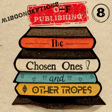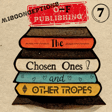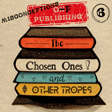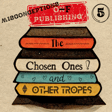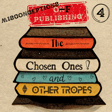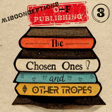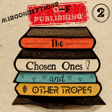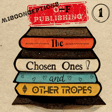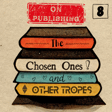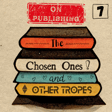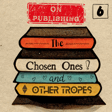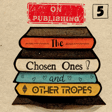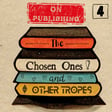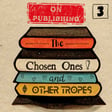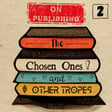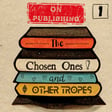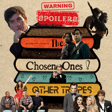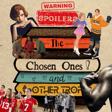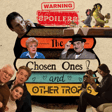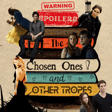Become a Creator today!Start creating today - Share your story with the world!
Start for free
00:00:00
00:00:01

S3.E7 - Psychological Thrillers
Naomi takes point on this one telling us all about one of her absolute favourites, the Unreliable Narrator. Jamie and Melissa try to chip in as well.
- Naomi Gibson, author of Every Line of You, Game Over Girl
- Melissa Welliver, author of The Undying Tower, My Love Life and the Apocalypse, Soulmates and Other Ways to Die
- Jamie Greenwood, creator & host of the Write and Wrong Podcast
Transcript
Toxic Characters and Psychological Thrillers
00:00:00
Speaker
Do you reckon Christian Grey is different characters? Whoa! You had it here first! I'm sort of finished it. After every episode was like, oh my gosh, I'm so angry at these toxic characters, like she'll have more food in my mouth, press next episode, because I loved it, but obviously I hate it. This is so much fun, right? Because this is my Malfoy Hermione family. Yes! She shouldn't have done that. I'm trying to make Neville happen. It's too wholesome.
00:00:41
Speaker
We're doing it again. A whole episode of Unreliable Narrators. Hooray. So that's like a logical thriller. Oh yes. Let's talk about tropes and stuff. This week we're doing psychological thrillers. Hooray.
00:00:58
Speaker
Well, we were going to do thrillers generally, but then we realized it was actually a massive genre and we thought maybe we should tighten it down a bit. And I also think since we're doing this based on trends, I think specifically psychological thrillers are the thing that's trending in both adult and YA more than just general thrillers.
Unreliable Narrators in Psychological Thrillers
00:01:17
Speaker
So let's kick things off with probably the most qualified of the three of us to talk about this, Naomi.
00:01:35
Speaker
Um, so I've talked about, uh, unreliable narrators before, I think. So apologies if you've heard this all already. I'm going to be trying more succinct because I realize, um, the whole episode is not just about unreliable narrators. So as much as I would love it to be, uh, gross, gross. So my, uh, favorite psychological talk about the trope is definitely unreliable narrators.
00:01:49
Speaker
Thanks very much. Yes, welcome to my TED talk.
00:02:00
Speaker
And they just have so much scope, you know. I mean, there's this whole argument that any book written in first person is going to be unreliable because that person's going to have thoughts and opinions with people. Oh, oops. Just drop it. So dramatic. I'm waving my phone around as I'm talking because I'm so excited to be talking about it.
00:02:24
Speaker
So yeah, so there are many different types of unreliable narrators and you could argue that anybody is an unreliable narrator. But my favourite type are the liars, which probably says a lot about me. But anyway, you can get the kind of liar who lies to you outright. So as you're reading the book,
00:02:46
Speaker
You know, they're omitting truths, they're spinning the story. That is definitely not true and you don't really know about it until like halfway through when the rug gets pulled out from under you and you realize that actually this guy is a psycho or whatever. So you have that kind of liar. But then you also have this other type of liar who lends itself so beautifully to psychological thrillers and they are the liars who lie to themselves
00:03:13
Speaker
because they can't cope with the truth. They probably have something dark and brooding in their past and they don't want to face up to it. They don't want to know what happened. So they tell themselves this version of events that has lots of holes in it. And your job as the reader is to try and pick through it and work out what's real. And as the plot is going on, this liar will probably have to face up to the truth
00:03:42
Speaker
of what happened and come face to face with it because their past is probably not going to be the A story. It's probably going to be a subplot. And as the A story evolves, they're pushed to uncover the past as well. So it usually means that they're going to be forced to confront it, what happened to them around the same time as the climax of the book. And obviously they'll be interlinked somehow.
00:04:07
Speaker
Um, so yeah, so there's some really good examples though, like, uh, the perks of being a wallflower is, uh, definitely an unreliable narrator. He has got some, some troubled past going on there. That's some really quite sad one. Um, but then you also get, um, narrators like girl on the train who has like pockets of amnesia.
00:04:33
Speaker
because she is a bit of an alcoholic, which obviously she's... Just a bit. Just a little bit. She's trying to get over something and she's like compensating for it by drinking a lot. And one night when she's sort of blackout drunk, something happens and the whole book is her trying to remember what actually happened.
00:04:51
Speaker
and her battling her alcoholism as well. And that makes for a really nice and reliable narrator. I also really read one recently about a woman who was an insomniac and the deeper she went into her insomnia and the less she was sleeping, the more
00:05:09
Speaker
unreliable she became because she wasn't quite sure what had actually happened because she started hallucinating. People who hallucinate can never really be fully trusted. Then if I'm going to have a little meta moment, I'm going to reference my own work and say, game over girl, it's a pretty good unreliable narrator. I've heard of it. Yeah, because she tells you pretty much on page one that she hallucinates and it's your job to decide what's actually really happening or not and hopefully.
00:05:37
Speaker
When it comes to hallucinations, and some people call it, the movie term is lampshading when you know that the writing is self-aware of something that it's doing and you highlight it. They do it in euphoria. Zendaya's character pretty much says she's not reliable as a narrator.
00:05:59
Speaker
Do you like that kind of thing? Obviously, Game Over Girl, you do it early on. But do you think that kind of adds another element to it where you're using this trope and the narrator themselves has been like, you shouldn't trust me because he does it in the name of the wind. He also is like, I'm lying. So with that kind of a liar, you have to be
00:06:22
Speaker
you have to still be prepared to trick the reader somehow because you're telling them outright, don't trust me. And then obviously the book is a thriller. So when you try and pull off that twist, it has to sort of be unexpected, but still fit with everything I said. So if you're going to say to some, say, tell your audience, don't trust me, you have to kind of layer in believability somewhere. So you do actually get that trust in the end. And so when you do pull the rug, it's like, oh, she still did it anyway. She still tricked me.
00:06:52
Speaker
I guess it can be really impactful as well, because then the narrator themselves can be surprised by something. So by highlighting where there's almost like a back and forth with the reader and the narrator, where the narrator has the power, because they're saying, haha, I could trick you and you wouldn't know. And then if that character is surprised by something, that then kind of takes the power away from them and almost gives it back to the reader. Yeah. Yeah, definitely. You experience it with them at the same time. Yeah.
00:07:21
Speaker
I think you mentioned the two types, which I think broadly is a great way of looking at it, where you have the one that's lying to the audience and then the one that's lying to themselves. There's also the third type, but I think this is a less dramatic type and it might be
00:07:38
Speaker
too boring for your tastes Naomi and that's the like unreliable because they don't have the information like in The Great Gatsby, Nick Carraway doesn't have all the information. He is genuinely telling you the reader like what he thinks, what he observes. He just doesn't, he's not reliable because he's just one guy and has only one point of view he's not all seeing you know.
00:08:01
Speaker
Yeah, so that type of unreliable narrator is called the nafe or the innocent. Like you say, they probably have a very different take on the world.
00:08:12
Speaker
So you can get autistic characters who view the world very differently. It's not so much that they don't have the information, it's just the fact that they process the world in quite a different way to you. So they're not almost as reliable because you're getting a very skewed viewpoint, which is the same for Nick Carraway because he's a completely different social class, isn't he?
00:08:33
Speaker
Yeah, in like a weird way, because that whole book is largely about class. Nick Haraway is technically born into a higher class than Gatsby, but Gatsby has so much money that he kind of artificially inflates his work. This isn't about the people we're talking about. But there are other different types of unreliable memories as well. Like you get the psychopath, like Humbert Humbert, who's just continually justifying why it's okay to sleep with teenagers.
00:09:02
Speaker
Yeah, yeah, yeah, yeah. Or liking you. Yeah, Joe from you. He's a sign of death. Yeah, and he lies to himself and everyone. Well, I don't actually think he does. I don't know, he's not a liar. He tells you pretty clearly what he's doing. And, you know... Yeah, well, us anyway. Well, yeah, us. But he goes about it pretty systematically. Like he's, I think he's aware of what he's doing. It's just that he's... He like believes...
00:09:27
Speaker
He's okay, but he's doing the right thing. Yeah, exactly. Because obviously, I suppose I was thinking of it being a lie, but I think you're right. Because he says things like, oh, she obviously wants me because she's doing this, he says, creeping on her in her bedroom when she thinks no one's watching. So of course, we're assessing that situation going, no, incorrect. And he's like, no, I am correct. Yeah, like, I guess he's less lying to himself more like, no, you are, you're just wrong.
00:09:52
Speaker
He's just always justifying his opinion. He reframes everything as, no, but she loves me and she just needs to realise that I'm right. Eventually she's going to love me as well. I'm doing this for her. Yeah, exactly. I was always doing her a favour by letting him into her life.
00:10:15
Speaker
As someone who's written this, Naomi, from a writer's perspective, are there challenges? What are the things where if you mess this part up, it could ruin the whole thing?
00:10:29
Speaker
I think likeability can be a problem because you often get these characters who are very damaged and they're trying to protect themselves in some way and that often means that they're probably not going to be very sociable, they're probably going to be very awkward, they don't immediately like them and I think reading about someone who you don't like
00:10:52
Speaker
can be tricky. So you have to kind of almost buy the reader's sympathy through a different avenue. So like with Game Over Girl, I made it very clear she was an orphan and we should all feel sorry for her. So you're kind of like asking for the reader to give me sympathy here because that's not the main plot, but it will circle back. So likability can be a real issue, I think with unreliable narrators, particularly
00:11:23
Speaker
Someone like joe from you you know he is so charismatic and you do almost like him but you know you're very aware that you shouldn't like him.
00:11:31
Speaker
Um, so yeah, true. He, cause they've, they've, especially in the series, like Penn Badgley is very charming and, uh, welcoming. Um, he's very disarming, I guess. So it is hard. You do find yourself through episodes of that show. Kind of, at least I did. I was like, I kind of forget that he is a psychopath and a villain and that you do start being like kind of rooting for him. And then, yeah, you do. It's interesting.
00:11:58
Speaker
The writing is very careful to every now and again, just put like a stop cap in and remind you that. Like, hold on, you're attaching too much to this character. Make him do something insane. Melissa, would you ever write this?
00:12:15
Speaker
I think when we've spoken about this before, I think it's a really cool trope and I think it works really well. But I don't know if I, I don't know, I write everything in first person, so it would probably work quite nicely. However, I don't know if I like have the skills to do it right now. Like I feel like I need to research more because you know, I'm like, I can't do anything without like
00:12:38
Speaker
planning every single inch of it before starting. So I feel like I would have to read more of it. I think especially we talk about books and TV shows, I think in books you can play a little bit more with the fact that there is no visual, like we're not seeing anything. So as I was saying, like with you, Joe, they'll show us the scene and any normal person at home would be like, wrong, that is naughty, you shouldn't be doing that. And he will be like, this is why this is completely acceptable. But because
00:13:04
Speaker
they have the visual they don't need to like spell it out too much that he's in the wrong for doing that because we can see the same thing as him he's just coming to a different conclusion whereas i think in books it can be really fun because there is no visual so you are completely in control via the narrator of what's going on yeah so it is really cool i probably would like to do it at some point but yeah like it scares me a bit because it's very clever Naomi so good job
00:13:28
Speaker
I think if you're going to do it, you just have to be, you have to know what kind of unreliable narrator you're writing before you go into it. It's like tips, guys, tips. Yeah, because if you're just going to be lying to everybody, you know, like, it's like a murder mystery and you find out who it is at the end, you know, that's, that's not
00:13:48
Speaker
That's a little bit almost superficial. Whereas if you're going to be writing about someone who's lying to themselves, there's like a bit more thought has to go into that almost because you need to understand why and the why can be quite hard to figure out sometimes. Yeah. It can help like create the character as well as the plot. If you have somebody like that as well, I think. Yeah. In terms of fleshing out your characters and working out why they're going to do things and often writers talk about, you know, the want and the need. Yeah. But this seems to provide both quite neatly actually.
00:14:17
Speaker
Yeah, they do intertwine, I think. It's really interesting when you look at the name of the wind, which is, it's set up as this character goes into like, it's a fantasy, so it's in like a medieval fantasy setting, but this character goes into like a tavern and speaks to this person who's there, and this person is essentially regaling him these kind of epic stories of his past.
00:14:40
Speaker
but it does jump back to the present quite a lot and when you're in the past you're basically listening to the story being told by the character which is the part which you know is unreliable but whenever it's in the present i think it's third person omniscient and you know that that is that that therefore should be reliable and often in the present stuff
00:15:01
Speaker
There are other characters who talk about that character and are basically inferring that, yeah, you don't know how much of this main story he's telling actually happened, how much he's exaggerating it and things like that, which is an interesting way of doing the stroke. Yeah, because the other character who's in the present, Bast, his friend, was only there for a bit of the story he's telling, so he can't verify events for a lot of it, can he really?
00:15:31
Speaker
Right. He doesn't even... I think because there's been two books now. Yeah. Is he even in? He doesn't feature in the past. Yeah. We haven't met him yet in the retelling. Presumably he's in that unfinished third one. Yeah, in those later. Do you guys think this trope works better in books than on screen?
00:15:56
Speaker
I don't know if better is because I think it does work on screen and it is like really fun on screen but I do think you can have a bit more fun in a book with it and like also I feel like the conversations you could have if you're like buddy reading with somebody else or it's a book club conversation is better because you could both come to different conclusions as you're reading because of it being unreliable. So I think I don't know if it's like what's better but I think it can be more fun.
00:16:18
Speaker
I think because it's in first person, it's so much more immediate, whereas on TV, you're watching it happen. You get a lot more internal thoughts and reflections in a book, but that doesn't necessarily make it better. It just makes it like a different experience, I think. Also, the on-screen translations of this, there's often like a voiceover over the top of you watching something else. Oh, there can be, yeah.
00:16:45
Speaker
because it's hard for them to do a lot of the stuff without that. Without some. Because of the innate way the name works versus a book. Have you, wait, every line of view wasn't fully unreliable, was it? She probably veers more towards the psychopaths I prefer narrator in that she's making these really bad decisions and she's continually justifying them to herself. But yeah, she wasn't like,
00:17:13
Speaker
lying to herself at any time really. Yeah, I agree. Do you think you'll ever not write an unreliable narrator? No, I think... I think everybody is just like, when I write a character
00:17:30
Speaker
I like them to be three dimensional and everybody's lying to themselves about something somewhere. So everyone's unreliable. I don't know. True. And you were always writing in first person at the moment. Yeah. At the book I've just written was third and that was actually... What? I know. It was so different. Yeah. Was it third close? Yes. So you did those thoughts. Yeah. He's a little bit unreliable, but not as immediately so. But anyway.
00:17:57
Speaker
Okay, okay. Okay, cool. I mean, in conclusion, it's a great trope. And within psychological thrillers, it's like such a staple. Yeah, absolutely.
Identity Crisis and Dual Personalities
00:18:08
Speaker
When I think of psychological thrillers, I think of the huge names, the big ones that stick out, like Gone Girl is probably the first thing that comes to mind.
00:18:17
Speaker
Yeah. She's probably a psychopath. Probably. I know how that story ends. I'd say yes. It's cool though. Anything else to add on that before we jump on the next one?
00:18:35
Speaker
I rest my case, your honor. It took all day. I really could. Thanks for coming to my TED talk. If anyone does want to hear more about that, I think the very first episode of season one, we did a whole episode just talking about unreliable narrator. It's a deeper, deeper dive on the whole thing. This leads quite nicely into the trope that I picked, which happens often in psychological careers, and that is
00:18:59
Speaker
the sort of identity crisis when characters are faced with a sort of dark internal version of themselves of evil counterpart.
00:19:11
Speaker
And this is one that it goes back really far. You look at the classics and a lot of it must be inspired by things like Dr. Jacqueline, Mr. Hyde, which to me always seemed like the obvious inspiration to The Incredible Hulk. Yeah, for sure.
00:19:30
Speaker
It's a really cool trope for investigating the idea that everyone has two sort of battling personalities within them. Everyone has like, you're not just one person with one opinion. People do flip-flop between, I think this, I think that, I like this, I like that. Obviously on a much deeper level. That sounded really shallow the way I explained it.
00:19:56
Speaker
Because the examples of this are things like American Psycho, Fight Club. And obviously we already said spoilers ahead of unreliable narrators. This is like way bigger spoilers even than that, if you can believe it.
00:20:10
Speaker
And a lot of this ties into that too, because a lot of these are unreliable narrators in Heron, Fight Club. You don't realize that the two characters are actually one character for a long time. So you're following the point of your character thinking the whole time that he's talking to Tyler Durden, but Tyler Durden is him.
00:20:29
Speaker
Yeah. So good. So would, would that be psycho? No, that would be lying to themselves. He's lying to himself. Yeah. Yeah. Cause they've like created a way to deal with the issue without having to deal with the issue, right? Yeah. Yeah. An internal solution.
00:20:44
Speaker
And that's all about the duality of his personality, the two extremes of his personality, the kind of mild, meek one, and then the very aggressive, hyper angry, fight the system one. And then it's how the force inside of him that is dictating what he actually wants to do is the more violent one. And as the book or the movie, depending on which way you
00:21:10
Speaker
Embrace that medium. You see as it goes on, his meek side goes more and more towards what he actually wants to do, which is be the more violent, more aggressive one that also happens to look like Brad Pitt. American Psycho, I thought was an interesting one for this. Again, I would say Anuranabu narrator in that he doesn't know, is lying to himself and also doesn't know and might not actually, might just be hallucinating. Other examples I had, Black Swan,
00:21:42
Speaker
She's having a total identity crisis. She is literally seeing an evil version of herself in the news. But that's a really cool way of doing it. There are so many spoilers for this, aren't there? Because I was just thinking, like the third season of you. Yeah. Yeah. It's book three, season four, isn't it? Yeah. Gosh, there's been so many. Yeah. Yeah. It's the latest season. The season has just been on. Yeah. Might be four.
00:22:10
Speaker
I was getting to that one because that brought up an interesting point to me where I was thinking like, do you guys like it in these kinds of things where there is like a kind of dual personality within someone? Is it better when it's, you know, early on that it's going to happen or do you prefer in something like a split? I don't know if you guys saw M. Night Shyamalan where James McAvoy has like a hundred personalities and that was very much in the trailer or it couldn't be like a surprise or anything like that.
00:22:38
Speaker
Do you guys think it's better when this is done when you go in knowing that that person has multiple personalities? Or do you think it's more interesting in something like an American Psycho or a Dr. Jacqueline Mr. Hyde where, or even the last, that most recent season of You, where you find out right at the end and that's the twist and the twist is, oh, actually both of these people were the same person. Or like, you know, you were doing things without realizing it the entire time.
00:23:03
Speaker
Yeah, I think if they can get it nowadays, it's fact like, so M. Night Shaman, the interesting thing about that, of course, was everyone knows him for his twists. Yeah. That's literally the whole thing is they were dead all along or this person was actually talking to a ghost of this person. And it's like this whole thing. I'm not even going to bother saying spoilers because all the things I'm saying are really old films. It's like so meme-tastic. You've probably seen it in a GIF. Like just don't even stop. I'm not going to say spoilers, but you know, he's known for having a twist right at the end, right? Yeah.
00:23:33
Speaker
Um, so I think if you can do it, cause the problem, so for instance, when I was watching you and I don't watch a lot of thrillers, so actually usually I am, I am got good by a twist in like a thrill because I'm not used to them. So like, I don't see them coming. So I really enjoy them. Actually, I did see that one because I think it's so overdone.
00:23:50
Speaker
that you can start to see it. But if it gets me, that's the best. Oh, that's the best. If it gets me, I'm like, I can't believe I didn't see this. And then they go over all like the clues I missed. I love it. But I think it's hard to get people with that now because it is a very common twist. Yeah, that's so true.
00:24:06
Speaker
Yeah, I mean, re-watching The Sixth Sense for the second time was mind-blowing to me, because I was like, I'm down. How did I not see this? I suppose it's not technically speaking to himself, but the original thing of that's a huge twist that he's not actually speaking to you, thinks he speaks to you, and it's all been revealed to you at the same time as he's revealed something about himself, like Bruce Willis.
00:24:30
Speaker
he's trying to get to terms with like this grief of his death and blah blah blah. So yeah like it works, it works if it gets you. I just think that one was so popular and famous and then it's been done so many times it is very spotable. You have to be very good to hide it.
00:24:45
Speaker
The Sixth Sense kind of ruined that for a lot of things, but it's also, they did it so well where it's like, you can watch it back and like, at no point does he ever speak to anyone except the kid. Yeah. It's so clever. It's really, really well done. It implies so much that you, but you don't actually see it happen. Yeah. It's really, really clever. He's sitting with his wife at one point at the restaurant.
00:25:09
Speaker
He overtly is talking to her, but when you actually listen to what she's saying, all of the responses are rhetorical and not... She's talking to no one. She's talking to herself. It's so well done. It's so cleverly formed. But I think... Yeah, I think one of the things I was thinking about with this as a trope, like you say, Sixth Sense kind of has ruined this for a lot of things. It makes it so hard to make it a twist. Because M. Night Shyamalan himself, we now... If you ever go see a movie by him,
00:25:38
Speaker
you are expecting a twist, which makes it sometimes harder for him to get, like to twist him. Yeah, exactly right. I mean, I think this is a great trope, but I think it works best in scarcity. If you can do it, to be fair, he did it back to back because he did Six Cents and then he did Unbreakable, which I also think is brilliant and that twist I think is great. That is a good question.
00:26:00
Speaker
But then he had a string of movies where all of them in theory had these big twists, but it's like the more you do it, the more people are anticipating it, the more you have to jump through hoops to get it around people. It just gets harder and harder to maintain that kind of trajectory. I think, yeah.
00:26:22
Speaker
These things need to be done in scarcity and that's not just your own writing as in like if they're very popular at the moment. That's why I have a lot of respect for psychological thriller authors because a lot of psychological thrillers do depend on a large kind of twist moment.
00:26:40
Speaker
And it's so difficult to think of an original twist that is not easy to predict because people reading that genre have seen already like dozens of different iterations of like a twist which involves various different, doesn't necessarily involve this trope, but just generally psychological thrillers do involve twists and it's so hard to consistently write twists over and over again.
00:27:05
Speaker
Yeah, absolutely. I like to say your audience is so wise these days. How are you going to... Literally, unless you're me.
00:27:17
Speaker
Um, I had some, there were some funny examples of this outside of psychological thrillers though. Um, cause dual personality, like identity crisis thing. I think it's, it's such an interesting thing to investigate and also people love doing it in movies. So like, um, Gollum in Lord of the Rings, obviously it's a great example of, uh, the dual personality thing. And you, there's always, whenever you have a dual personality character in a movie, there's almost always a.
00:27:44
Speaker
a mirror scene or like with Gollum it's his reflection in the water. Love it. Yeah they love that don't they.
00:27:50
Speaker
Or they just cut to different, he like looks in different directions and that's the other character, you know? Yeah. Have the conversation themselves. Then there's, I was thinking of the amazing scene in the original Tobey Maguire Spider-Man movie with Willem Dafoe, where he's talking to himself in the mirror. Oh yeah, that's what I thought, yeah. Such a good scene. And you can tell he's all doing it at one take as well. He's just changing his face as it like cuts between the cameras. It's great. But like, generally, I kind of, it's a bit on the nose, perhaps.
00:28:20
Speaker
especially when you've got characters like Green Goblin is obviously pantomime levels of villainery. It is a cool way of demonstrating losing of oneself, hallucinating is the conversation in the mirror and bits and bobs around that. I think it's very dramatic, but I do like it. I guess it's sort of a guilty pleasure because it wouldn't work in a very grounded setting, I don't know. I think it would. I think the reader- I guess Black Swan does it.
00:28:49
Speaker
Yeah, the reader, the reader wants to see this, you know, because they're probably aware that it's going on. Yeah, it is a trope for a reason, right? Yeah, and for it to be shown to you so bluntly is really exciting, you know, like the mirror scene, the facing the water scene kind of thing of Gollum.
00:29:08
Speaker
it just clicks for you as a viewer. You're aware that there's something not quite right and then you get confronted with this absolutely alternate personality who is the complete antithesis of your main character and it's just so satisfying to watch it unfold that I don't think that'll ever get old for me anyway.
00:29:28
Speaker
I guess also, now I think those are the scenes that we really remember. I mentioned that scene, you guys, I imagine, know exactly which scene Lord of the Rings I'm talking about. That's the scene everyone talked about in Black Swan, the mirror scene. Yeah. Yeah. And maybe it's just our generation, but I feel like everyone knows the Willem Dafoe scene in Green Goblin. Yeah, for sure. Not a millennial thing at all. There's so many memes about it as well. Yeah, there are.
00:29:59
Speaker
The hardest thing maybe with this trope is you have to keep... I think almost the purpose of the trope is to represent duality of a character, to represent the two extremes of that person and the battle within. So I think it can be very important to make sure that there is a clear delineation between the character you know, the person who the world knows and
00:30:27
Speaker
the kind of evil counterpart, the extreme part of their personality, that only they see that they're hiding. And beyond just aesthetics, like it's not, I don't really think it's good enough to just have one of them look slightly different than the other. Because if you, so much power for this trope rides on the yin-yang part of it. And if you lose, I think if you lose that thread, there's a risk that you kind of lose the impact of having it. And you're like, well, this person's just like, this is just their voice in the head. You know what I mean?
00:30:56
Speaker
everyone just has their own voice in their head. It doesn't necessarily mean that there's a whole other side to them. By having this super extreme, usually dark version of themselves, there's a party that's like, wow, if this person breaks, what would they do? How far would they go? I guess caveat to that being sometimes stories with characters like this, there is a moment where
00:31:20
Speaker
the ends of the spectrum start to merge and blur, where you're losing one part of that character into the other, whether that's overcoming their demons or whether it's their succumbing to their demons. In Fight Club, I guess you would say... It's hard to say what the moral high ground is in that movie, but
00:31:45
Speaker
He kind of fully embraces the Tyler Durden side and there's the kind of blurring of the lines there. But I think when you do that, it has to be a very deliberate thing and you have to show what is being lost. And that's usually like morality, but it could be other things. It's like you're giving up this part of your personality to fully embrace that part of your personality.
00:32:07
Speaker
Yeah, like it comes at a cost almost. Yeah, exactly. It's like, yeah, you'll gain this, but you'll lose this, whichever way it goes. It's like great power comes great responsibility. It's a good line though. It is, yeah, Willem Dafoe doesn't think so in that movie, to be fair.
00:32:31
Speaker
Uh, did you guys see, I haven't watched it, but, um, apparently they absolutely butchered that and like reordered it in Madam Web. Oh, I haven't seen Madam Web. Oh, that's so funny. It's not copyright. I guess. Well, they own the rights. Oh, that's true. I keep forgetting which Marvel films are in, but they're all in now, aren't they? The same owner. Technically, Sony owns all Spider-Man. They loan it to Disney.
00:33:00
Speaker
Oh, interesting. Yeah. And there's a constant battle between Disney and Sony as to whether they can still have it, I believe. I think Sony have done quite good things with it, to be honest. Yeah. Name one. Name one good thing Sony have done with it, not only. Maybe it's because I'm a millennial, but Tobey Maguire, you know. I mean, yeah, to be fair, those... They were pretty good movies.
00:33:25
Speaker
Well, the first two. You've just, you know, gone nuts about Willem Dafoe and then you're snagging on Sony. That's true. But in my head, that's like, that's like the pre, that's like the precursor to the modern superhero era. You know what I mean? Those were like before Iron Man.
00:33:47
Speaker
But getting back onto this trope, if you're doing that transition where one becomes the greatest superhero film of all time with William Defer, when he fully becomes the Green Goblin at one point, because he's pretty sympathetic at first. You see him battling his demons and then by the end,
00:34:10
Speaker
when he is fully ready to just kill Peter Parker, you see that he's completely become, well, he's like 99% Green Goblin at that point. Yeah, they're just blended, haven't they?
00:34:21
Speaker
Yeah, but they do a good job of it slowly going that way and then especially the scenes where he's like it by himself, pulling his hair out, yelling at the mirrors and stuff. You see him losing touch of his old self and becoming the new self because if you don't do that, if it suddenly just like clicks and like off screen, you're like, oh, I guess that happened without me being able to see it. That's when you get like a Game of Thrones season eight situation. And we don't know how that went.
00:34:50
Speaker
No, because we pretend that one doesn't exist. Yeah. What do you mean? Finish the seven? Finish season eight? What?
The Mysterious Stranger Trope
00:34:58
Speaker
I haven't watched all of Vampire Diaries, but I'm pretty sure, isn't there a... Excuse me, you can't be friends anymore. Sorry. Isn't there one season where there's like loads of versions of Elena? Yeah, but they're all doppelgangers, so they're all individual people.
00:35:18
Speaker
Oh, okay. Yeah. So she, she is a doppelganger of the original doppelganger, which is used for lots of magic stuff. So there's like Tatiana, that's one of her doppelgangers, which I believe, I think it needed breath is Bulgarian. I could be wrong there, but she speaks another Eastern European language. I think it's Bulgarian. And so she speaks that cause Tatiana is the same. And so she's like a thousand years ago. And then there's Catherine. Oh my gosh, there's so many. There's so many needed breath was just like playing every character in that show.
00:35:46
Speaker
okay yeah i guess that's that's probably not this trope that's something else but if you watched it jamie you would know oh sorry yeah i better let me put it on my list what a fool you feel now yes i'm so embarrassed i got it what's the other one called the originals the originals
00:36:04
Speaker
Yeah, the originals, Legacies. Come on, keep up. Wait, there's one called Legacies as well? Yeah. Oh God. Are they still making these? I'm not sure about the Legacies ones actually. It's like a boarding school for all of the magical children that appear during various other seasons of the universe, if you like. Oh, it's not just a boarding school with vampires.
00:36:25
Speaker
No, it's not just vampires. It's werewolves, hybrids, vampires, witches. It's the gritty version of Wednesday. I thought Wednesday was pretty gritty. That's true. Pretty dark, I thought. Awesome. That about rounds out what I was going to say about identity crisis and evil counterparts. Unless you guys have anything to add, we can jump onto whatever Melissa's doing. Whatever I'm doing. Whatever she's doing.
00:36:55
Speaker
What am I doing? So as we've already established, um, I'm not like a huge thriller consumer. Um, I don't know why, because like whenever I watch or read them and I'm saying watch a lot, because again, unless you're buddy reading me, so what the thr-
00:37:14
Speaker
psychological thrillers are really fun to discuss with people what you think is going on, what you think the twist is and stuff. So I say watch because I'm thinking of like when I'm watching a television show and I say weekly and then I talk to people about what I think is going to happen. So I do associate more with watching it. But I have read some, I've obviously read Naomi's, the best ones. Yeah, obviously.
00:37:34
Speaker
So yeah I did struggle a bit more to think of a trope for this and I think we were having like a quick discussion before I started recording and we were realising not only just thriller which was like I know we're doing now like psychological thriller to sort of put a pin in it because there are so many things that can be considered a thriller because if you think about it the reason this is going to be so popular is because it's thrilling like that's the book or that's the tv show you're doing something thrilling so it's getting people's attention immediately and they
00:38:01
Speaker
they wanna feel a bit scared and stuff. So I was thinking of, because I've watched a lot of horror. So my immediate thought went to lots of different horror tropes and I realized they were more horror than thriller, but thrill, part of thrill, isn't it? It's like adrenaline and it's like being a little bit scared. So a lot of these are obviously also like a bit spooky. So I was struggling a little bit, but I did knock on one, which is the mysterious stranger, which I do think is used quite a lot across different genres.
00:38:30
Speaker
and also can make a genre thrilling so like some of my examples are going to be from like long-running soaps they quite often like to have a psychological thriller storyline and they will start it with a mysterious stranger and it throws you because you recognize all the other characters so well you've literally watched them for years or whatever and then someone appears and you're like who who is that who is this i'm checking soap tv online they can't add a new character it makes you really cross uh well always
00:38:57
Speaker
And so yeah, so with serious stranger is if the trip is essentially, they introduce a character that so I guess in a book,
00:39:07
Speaker
It's more along the lines of you don't know who they are because they're not introducing themselves. And if it's on screen, you usually get shown like a shadowy, like alleyway where someone's peering around, or they do that thing with the camera where somebody sat doing something and then they have the camera like peer around a bush. And then the person goes, oh, I feel like I'm being watched. And I do really like it. Like, I think it's quite a fun way to inject.
00:39:33
Speaker
like a little bit of interest and intrigue into something long running. I'm not sure how well it works in a shorter setting. So we were also talking about Harlan Coben did that Netflix one called The Stranger. He now does millions of Netflix ones. I don't know what I'm saying he is if he like does everything and like films it and everything. Obviously they've bought the rights to the Harlan Coben Netflix universe and they just keep pumping them out and I've watched a few of those
00:40:02
Speaker
And of course, I'm probably always caught up like, oh my God, I can't believe it was there because I'm an idiot when watching thrillers. But they are supposed to be psychological thrillers and they're really wildly popular. And he literally did one called The Stranger and the entire plot hung around The Stranger. So like the opening scene is like they're at a football club.
00:40:20
Speaker
he's taking his kids to football or whatever and this woman wearing a baseball cap who is in like every episode watching various people, she walks up to him, whispers something in his ear and the result of whatever she whispers in his ear makes his wife disappear. And so it works even though it's obviously like you've barely known anyone very long. The thing to us is that I found problematic about it is everyone's a stranger because I didn't know anyone yet.
00:40:45
Speaker
So of course it's like, oh, this woman's a stranger. My is she, she could be, he could be having an affair with her or it could be like, I don't know who this woman is. Um, so I'm not sure how well it works with like a short running thing or if it's like the whole plot hinges around it. But I will say that is the thing that pulls you in because annoyingly you are like, ah, but what did she whisper? And even if the answer is rubbish, I've already spent eight hours of my life watching this entire show by the time I find out the answer is rubbish. So they've already won.
00:41:11
Speaker
Like, they have claimed me. There's nothing I can do about it. So I do understand why that in the thriller trope is really, really popular. And they also do it really well. Now, obviously it was sticking to psychological thrillers, however, vampire diaries.
00:41:27
Speaker
which in some ways could be arguably a psychological thriller because it's thrilling and has psychological elements, and I will make it work with whatever we're talking about. But yeah, they do it quite well in that is that they have, and they do this quite a lot of vampire things, they do it in Twilight Love as well, where there's something happens and someone's new to town and then people start dying and they're like, it's animal attacks. It's obviously the new vampire, I know is here, but actually, there's a vampire watching the background and surprise, it's actually the vampire's brother.
00:41:56
Speaker
who's returned and is doing it and they just show like a dark figure with lots of fog and it's like very common and you want to know like who is that then because we want to that works I think even though it's season one because we already know Stefan and we want him to like not be in trouble so we really want to know who the mysterious stranger is because we know for a fact he's the one doing it like all the naughty stuff
00:42:19
Speaker
Like, even if you think it might be Stefan, because you never get to see his face, like, you definitely are rooting for the main characters. So I think that one works a little bit better. But yeah, my favorite examples are definitely in, like, so, so I'm a massive Coronation Street fan. Like, when I was born, I was plonked in my little chair, like, in front of Coronation Street, my whole family, they've never missed an episode. I've watched all the classic Cori's, like, huge Coronation Street fan.
00:42:42
Speaker
and I watch all of them and this works really well on a long-running soap when they want to do a big storyline so they'll always like tell the audience we're about to do a big storyline see if people want to be like dragged into the storyline and it'll usually be a murdery thing and it will usually be there's some sort of stranger with a secret who appears on the street and is related to one of the other characters you don't know who they're related to and you have to find out about them and you they keep saying things that are like little easter eggs for later
00:43:10
Speaker
And you do massively get interested because it's a new actor, it's a new person for the street of people that you know very, very well. So the mysterious stranger element, I think, does drag in new audience. And so in terms of it being popular, I totally understand people will literally start watching a soap because there's a particular storyline and they want to be involved in that.
00:43:30
Speaker
So I think that works very well, like they've done it before with all sorts of like all sorts of murderers. Obviously you guys obviously know because you're bigger on issue fans as well, right? They've done it with Pat Villan, they've done it with Richard Hillman, like before they made the murderers they always arrive and they're kind of like a mysterious, usually cute stranger or they're like a love interest for one of our characters and then boom they're evil because obviously we don't know anything about them because they're completely new.
00:43:56
Speaker
So I quite, I do like it as a trope. I think it works really well. But I was wondering if it works well for me because mysterious stranger, I have no idea what's happening, as I say, like I'm tricked by everything. So maybe it works really well for someone like me to be an idiot when it comes to thrillers. And I'm like, who could it possibly be? Because I'll never work out.
00:44:14
Speaker
So I quite like it. And as I say, the problem is by the time you've worked out, especially if it's like a short running thing or like one book, um, I've already read most of the book or whatever, but this time I work over the mysterious strangers. So they've hooked me in enough to get through most of it. I've paid my money to the devil in order to find out who the mysterious stranger is. So I think it works. Okay. So you're, I wasn't coming at this with, from the point of view that the stranger had to be mysterious to the audience.
00:44:44
Speaker
Oh really? So like there's a there was a book there's a book by Ian McEwen called Enduring Love. A terrible title. Well there's a film as well which which has Daniel Craig in it. It's about these these these two guys there was like a ballooning accident and these two men happened to be there
00:45:13
Speaker
and they tried to, they didn't know each other, but there was other people there and they tried to kind of like pull this balloon down and save this guy who was trapped inside of it or something like that. I think they fail and things go badly and they're kind of like all a bit traumatized and they will leave and you follow the one character who was there with his girlfriend or his wife
00:45:35
Speaker
And then this other guy starts showing up. He calls him and he says, oh, yeah, I was at the ballooning thing. I'm like, can we talk? So he meets him and they talk. And then this guy is like kind of feels like they have like this bond and he's like, no, we don't. I don't want to see you again. And this guy keeps showing up and he becomes totally obsessed with the main character and won't leave them alone. And eventually it starts to like become scary. And then he finds like the guy, it looks like the guy is trying to like murder his wife and stuff so that it will just be them and things.
00:46:03
Speaker
That's one where the stranger is mysterious to the characters, but you as the reader know who this guy is and you don't know anything about him other than he happened to be at this accident that happened and they were both there and they were both kind of traumatised by it. That for me is like bread and butter psychological thriller.
00:46:25
Speaker
you know, something that you can't really understand about just an interaction or an obsession that's kind of escalates to these kind of scary, scary levels. That reminds me of the talented Mr Ripley, because that's the same sort of thing there where Tom turns up and I can't remember Jude Lord's character's name, but Jude Lord has no idea who he is really. And Tom just sort of inserts himself into his life and becomes obsessed with him. Yeah, exactly. And more recently, Saltburn.
00:46:56
Speaker
It's kind of like that. Yeah. So we sort of, yeah, and I suppose they reveal more of themselves, but we literally say, I guess there's two types of mysterious stranger there. And one of them is you literally don't even see who they are. And sometimes it's also implied that it might be somebody you already have seen. So obviously it's almost like a murder mystery type thing. Cause it'll be this mysterious stranger is doing this, but because they're not showing us their face, I'm assuming that they're either someone I've already seen or a really famous actor.
00:47:25
Speaker
And therefore they want my big reveal when they arrive and then there's the other one that you're talking about which is what happens more in like long running soaps and stuff when they want to introduce a psychological thriller storyline is they should they show you the person pretty much immediately and they're like the new the new face in town and they seem overly nice and you just know there's something suspicious about them or maybe you don't but you're thinking how do they fit in and so you do know them.
00:47:50
Speaker
but you don't know anything about their background, which is unusual, especially in a long running thing, which is like quite unsettling. So yeah, maybe there's two mysterious, because like when I was thinking mysterious stranger, I was thinking there's literally a Mark Twain like story, which is called the mysterious stranger. It's about a guy who like pretends to be an angel, but it's actually called Satan and they're a mysterious stranger at that point. And there's like the whole thing in Django.
00:48:17
Speaker
where it's like this is really common in like so many cowboy westerns where this is the thing, yes so many of them, it's like that new guy in town and yeah it's all about who was that man, what was his secret, a man appeared with a sad impenetrable face, literally the face is impenetrable, like you have no idea who it is, they're not described at all, so I feel like that was the one I was thinking of but I think there's definitely two camps isn't there? Yeah it's interesting, yeah. Because I guess it could also
00:48:45
Speaker
We're also thinking of it not as the protagonist or the point of view character, but I guess there's no reason why. Like if you take something like we talked about this last episode was revenge. She's the mysterious stranger to everyone around her, but she's also our point of view character. So we're, you know, in league with the mysterious stranger, which is quite a fun way to like engage with that story. Yeah. Yeah. They're probably quite unreliable as well, aren't they?
00:49:14
Speaker
Yeah. Don't you think guys, they might be unreliable. Yeah. I guess, yeah, I guess if they were the, if it was their POV. I think I've not read The Talented Mr Ripley, but I believe that's from his point of view. And he would probably be very unreliable, even though that I think is third person.
00:49:34
Speaker
Yeah. I guess the thing about if it's point of view, definitely reliable. If it's not point of view, the entire point of a mysterious stranger is they're bringing some really solid truth to the table that we don't know about. I feel like that's the point. Like this person is coming and they either
00:49:50
Speaker
know who's killing all the people or they know who cheated on their wife or they you know they have a secret which is literally what the Harlan Coban one is based around it's pretty much literally just a story of this trope like that is the Harlan Coban series I don't even remember what the secret was I watched the whole thing I could not tell you I can't even spoil it if I tried so it doesn't actually matter really because I watched the whole thing
00:50:13
Speaker
because I did want to know what the secret is. So I think you have to trust the mystery, weirdly, you have to kind of trust the mysterious stranger a little bit or rather you're trusting the storytelling technique because you know there's going to be something revealed to you that's interesting. Like that's the trust, isn't it? Which apparently Harlan Coven broke because I don't remember what the secret was.
00:50:32
Speaker
I have no idea. I think you have to trust them a little bit if they're not the narrator 100%, or else it's kind of not very interesting what they're going to say if they're like a pathological liar or
00:50:50
Speaker
I guess you either have to trust them or not trust them. There's no like middle ground. There's no like... There is no trying. They seem okay. Yeah, exactly. Just some guy having a pipe. Fine, I guess. Yeah. The only way that works is if they get like bedded in and then later it's revealed that's not all as it seems anyway. Like you can introduce a mysterious stranger and be like, oh, who's this character? And then they just do nothing for like 10 episodes and you've kind of forget about them and you kind of laugh at their jokes and think, oh, they're a cute addition and then boom.
00:51:20
Speaker
actually they're the person that's been doing this terrible thing around the town or whatever it may be. I feel like it's always like a small town in psychological thrillers. So that can sometimes, you can like bed in a mysterious stranger that seems really benign, but then the very act of doing that makes them not really mysterious and not really a stranger because you're making us get to know them before you're pulling the reveal. You're setting it up so that the revealed character is known to the audience. Yes, exactly. They did that in, did you guys watch WandaVision?
00:51:49
Speaker
Yes. They did that with Agatha in one position. She was like likable. I mean, the fact that she was a known actor versus the other cast was kind of a spoiler, but yeah, I guess that works.
00:52:05
Speaker
That's always a key, isn't it? I remember in the Sopranos, every season would start with this newcomer, this stranger appearing. One of them was Steve Buscemi. And I just remember thinking, whoa, he's obviously going to end up dead at the end of the series or something because I don't want to kill off an actual member of the cast. But he will last longer than one episode because don't pay out for Steve Buscemi. Yeah, exactly. I was like, well, he's going to be here till the end, but he's going to die.
00:52:32
Speaker
They also can't afford to pay him for lots of episodes. Yeah, he has a shelf life. They do that in Peaky Blinders as well. For the season, they'll be like a big name actor, like a Tom Hardy.
00:52:49
Speaker
And then it's like, well, you know that these guys are only going to be in a few episodes or they're going to die. They can't keep paying these anus actors. Yeah, they have other stuff too. But it's like enjoyable through the nature of it's such a big actor part of you is like, how did they swing this? And you're immediately invested just because they're there. The other example I had was in, go back a bit, I think it's season one of Buffy. Well, it's very early season of Buffy because I'm talking about Angel.
00:53:17
Speaker
He starts off as basically stalking her. He's like a mysterious stranger. So she feels like she's being watched. And then he's revealed and he seems a little bit benign, but actually he's a vampire and he doesn't tell her he's a vampire. And we have to work it out with her that he's quote unquote dangerous. But obviously that means they're going to love each other because they're not allowed to be together.
00:53:40
Speaker
But yeah, it's revealed slowly and that's kind of the secret that he's bringing and obviously he's there to kill the Slayer because Romeo and Juliet vibes. So that was the other example I had that was, it kind of creates, especially as I say in long running things, it kind of creates that sort of thriller vibe for, I think the reason I was thinking about a lot of long running stuff, not just because I don't watch or read a lot of psychological thrillers, obviously, but I do think they just use a lot of psychological thriller tropes in order to inject
00:54:09
Speaker
because they've got to think of a whole arched storyline that's going to last a few weeks or whatever it may be. So I feel like they use these tropes in order to go, okay, now it's a bit more like this and then another day it's like more of a comedy because that's what they're doing for that particular episode. So I think it works really well. I like it. I do get
00:54:28
Speaker
I'm such a sucker for like, I have to know, I'm so nosy. You know, if I can't watch the thing, because let's say I've not like paid for the streaming service or whatever, I will go to Wikipedia and find out. Because I just don't know, I have to know what the secret is. I'm so nosy. So it works for me. You'll have to go and look at the Harlan Coburn one again. I will actually, I can't remember what the secret was. And then tell me because I didn't finish watching it.
00:54:58
Speaker
I don't think there's anything particularly dangerous or to look out for with the mysterious stranger. I mean, we covered a bit of it, but it's pretty easy. It's so close to New Girl in Town. Yeah, it's basically New Girl in Town, but they're slightly dangerous, question mark. Yeah, but it's like, are they good or are they bad? They're not just naive. Yeah.
00:55:21
Speaker
Awesome. Well, let's round it off as we have started to do with asking the question of have you guys added anything new to your TBRs this week?
00:55:32
Speaker
Yes, let me just bring it up because I can't remember what it's called. That's me on my Kindle. I can't remember any books that are called on my Kindle because I only see the title ones. I have no idea. So I've added this horror book called This Wretched Valley by Jenny Kiefer.
New Book Recommendations and Episode Wrap-Up
00:55:49
Speaker
I think I'm pronouncing that right.
00:55:51
Speaker
It's about a mountain and it's about a cursed mountain in Kentucky. That actually sounds so good. Doesn't it? I thought it sounded like a movie I'd probably watch, I don't know, you know, like a Lake Placid kind of thing. So it's about then finding this mountain, no one's ever climbed it before, they're gonna climb it and then seven months later three bodies are found and
00:56:14
Speaker
It's all what happened on their climb and stuff. I don't know, it just sounded like an absolute laugh, so I've added that.
00:56:21
Speaker
Yeah, quite a laugh. A haunted mountain. Find out why three people died. Speaking of three people dying, I don't think this is related at all, but I saw that my friends have been nagging me to read a specific book for ages and Netflix has just released the adaptation and I went to my friends and I was like,
00:56:45
Speaker
Should I read the book before watching the adaptation and they were like, yes, do not watch the adaptation. So I've added the three body problem to my reading list. And apparently it's amazing. Yeah, I'm really excited about that. But my friends who have read the book are not so impressed with the adaptation. Is it a film or a series? Sorry.
00:57:07
Speaker
I think it's a series on Netflix. Yeah, I think it's a series. It's on Netflix. Yeah. Yeah. But yeah, I've committed to reading that and avoiding watching the show. Good for you. I'm just going to go and watch it. Good for you, mate. I'll tell you. Melissa, you got anything new?
00:57:30
Speaker
Yes, I do actually I think it I think it literally came out like I was gonna say yesterday without like dates the episode it came out at the end of March like the last Thursday in March and It is called the last murder at the end of the world now first of all long title I love a long title as you know
00:57:49
Speaker
Number two, it's by Stuart Turton, who did The Seven Deaths of Evelyn Hardcastle. That's one of those titles where I'm always like, The Seven Wives of Evelyn. What is it? Every single time. So I read that in book club, The Seven Deaths, and I liked it, but I wasn't like obsessed with it like a lot of people are. But I really like, he has really interesting ideas. So if you guys haven't read, I don't know who the hell hasn't read Seven Deaths at this point.
00:58:18
Speaker
But it's about like a fake, it's like a repeating day, like a groundhog day, and it's a murder mystery party. And you don't know why these people are trapped in this murder mystery, like virtual reality. And like, are they good guys? Are they bad guys? Is it a prison? You don't know. And you're trying to work, and whoever works out what the murderers gets to leave, but do they. And so it's like quite interesting speculative ideas. But the last murder at the end of the world is about like,
00:58:45
Speaker
there's like a hundred villagers and three scientists living in harmony on like an island. And I think it's like, you're supposed to think it's the end of the world, but there's always like loads of twists and I wouldn't see them coming. And apparently one of the scientists is found dead and it triggers like a security system thing around the island that's keeping the fog that kills everything at bay. And if the murder isn't solved in like 92 hours, the fog will smother the island and everyone on it.
00:59:11
Speaker
so and the security system wipes everyone's memories of what happened the night before so they have to like solve it even quicker and so what someone helping to solve it is probably the murderer but they won't remember and then you're also trying to work out why their memories are getting wiped and stuff so i was like oh it sounds like super dystopian and cool so i was like and also there's like a really nice braid edge edition at waterstones and yeah it looks so good on my shelf yeah
00:59:43
Speaker
Yeah, it sounds good, isn't it? I'm all excited. Awesome. One more thing. I read this, I can't confirm the accuracy of this or not, but I've read that
00:59:54
Speaker
at a recent panel or something she was doing, Rebecca Kuang, author of Yellow Face, Yellow Face Babel, and Poppy Wars. She was talking about what her next book is, and apparently it's about two university students who have to go through the layers of hell to find their college professor who, in a cult ritual gone wrong, ended up there because they need to get their extra credit
01:00:21
Speaker
And that's all, that's all I heard. That was the rumor that I heard about what it's about. Yeah. She writes across genres and takes her audience. It's amazing. I mean, other than yellow face, she's always somewhere in fantasy slash supernatural. Yeah. That's true. But yeah, that sounded hilarious to me.
01:00:47
Speaker
I guess she had, yeah, like Yellowface was funny. So I'm excited to see her writing something which is like funny and also has like supernatural elements and stuff. Yeah. Exciting. Awesome. I think that wraps up the episode. Yeah. Play the song. I think you should just do that Jamie.
01:01:11
Speaker
Thanks for putting up with our nonsense for another episode. To stay tuned to everything we're up to, you can follow the podcast on all socials at The Chosen Tropes. Follow Melissa at Melva, Naomi at Naomi G. Wright, and Jamie at Jamie X. Greenwood. Don't forget to check out Naomi and Melissa's books, as well as the Right and Wrong podcast. Thanks again, and we'll see you on the next trope.
